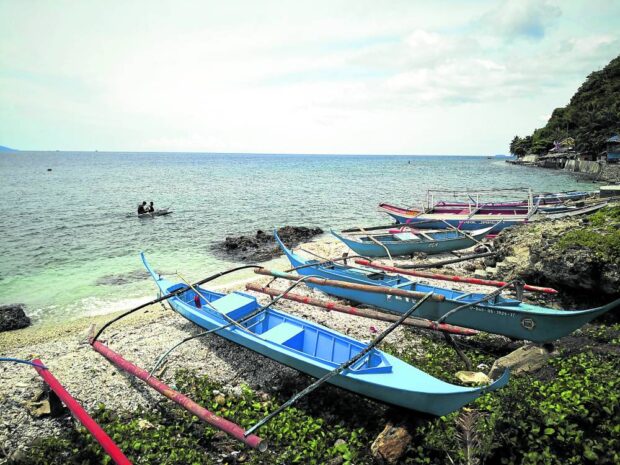
LIVELIHOOD Fishing remains the main source of livelihood in Barangay San Andres on Verde Island, off Batangas City and part of the Verde Island Passage. This corridor separating mainland Luzon and Mindoro island, according to conservationists, has one of the world’s richest marine resources. This photo was taken in 2018. —CLIFFORD NUÑEZ
A coalition of environmental groups has asked the Court of Appeals to compel the Department of Environment and Natural Resources (DENR) to designate the Verde Island Passage as a “non-attainment area” to stop further pollution in the world’s “center of the center of marine shore fish biodiversity.”
On Dec. 19, the Protect Verde Island Passage (VIP); Center for Energy, Ecology and Development (CEED); Bukluran ng Mangingisda ng Batangas; and several fisherfolk organizations in Batangas and Mindoro province filed a petition for continuing mandamus—a legal remedy solely for environmental cases—against the agency and its attached bureau, the Environmental Managament Bureau.
Also named as respondents were the National Water Resources Board, the Department of Health, and the Department of Agriculture.
Water quality tests
Under the petition, the groups urged the DENR and these agencies to designate the VIP as a non-attainment area after several portions of the biodiversity-rich passage exceeded acceptable standards for water quality.
Being designated as a nonattainment area would bar or reduce all polluting activities to prevent its further degradation.
In July, water quality tests done in marine protected areas (MPA) of Pola and Pinamalayan in Oriental Mindoro province—still part of VIP—showed that five of six areas exceeded 2016 water quality standards for oil and grease. But a follow-up test in September showed that all six failed to meet the standards.
An MPA in Ilijan, Batangas, also exceeded water quality standards for oil and grease, and ammonia.
The results came months after a massive oil spill off the coast of Oriental Mindoro leached into the marine ecosystems of nearby provinces, including VIP, the marine corridor separating the islands of Luzon and Mindoro.
Apart from the writ, the groups also asked the CA to issue a temporary environmental protection order to prevent the agency from issuing new discharge permits and environmental compliance certificates (ECC) to gas projects and LNG (liquefied natural gas) terminals and suspend existing permits of facilities along VIP and other areas affected by the oil spill.
It also asked the court to urge DENR to implement measures to prevent the further degradation of water quality in VIP and other oil spill-affected areas.
Health risk
Fr. Edwin Gariguez, lead convenor of Protect VIP, said the high concentrations of pollutants “can impact the fish, corals, and other aquatic organisms and can also pose a health risk to humans exposed directly or through contaminated fish.”
Irvin Doraemon, a fisherfolk leader from Verde Island in Batangas City, previously estimated that at least 20,000 fisherfolk who depend on the VIP were affected by the spill.
“Given the current challenges faced by the VIP, the DENR … must stop issuing discharge permits and ECCs until the waters are cleaned up, in the spirit of conscientious stewardship to protect the Verde Island Passage, and other threatened marine ecosystems in our country,” Gariguez said.
“The longer the subject waters remain unprotected and exposed to pollution, the more likely the damage and deterioration to these areas may be irreparable,” added Ivan Andres, CEED deputy head for research and policy.
This is not the first time these groups have sought the DENR’s intervention in the Verde Island Passage after oil leaked into the area when the fuel tanker MT Princess Empress sank off Naujan, Oriental Mindoro, in February.
In March, the same groups urged the agency and the provincial governments surrounding VIP to enforce a 6-year-old deal mandating them to protect its marine flora and fauna.
Back then, they asked that these parties immediately declare the VIP as a “no-go” zone for fossil fuel projects and transports, and to reject all pending applications to construct fossil fuel power plant projects in the corridor.